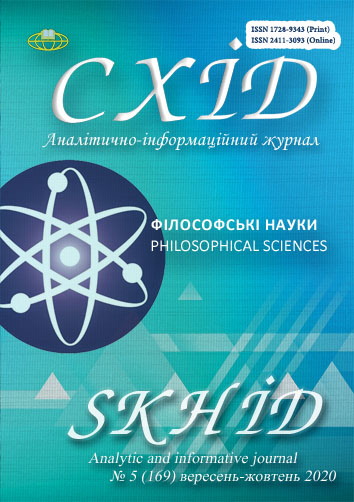SELF-IDENTIFICATION OF PRECARIAT REPRESENTATIVES
DOI:
https://doi.org/10.21847/1728-9343.2020.5(169).215042Keywords:
precariat, self-identification, work-based identity, money, self-brandingAbstract
This article is devoted to the self-identification of precariat representatives. The study on the identity is relevant due to the fact that for precariat, which lives in total instability and uncertainty, such factor of stabilization is much more important than for other social groups. The purpose of the article is to delineate self-identification features of precariat representatives. A cross-methodological approach has been used to achieve this purpose, including: systemic, comparative methods; method of synthesis and generalization of materials presented in the scientific literature on the researched problem. The main defining characteristics of precariat have been disclosed, including the lack of the work-based and occupational identity. It is concluded that the lack of work-based and occupational identity makes it more difficult to form a class consciousness of precariat, which, in turn, impedes the establishment of precariat as a “class-for-itself”. Nowadays, the formation of identity is often replaced with self-branding. Self-branding, however, does not contribute to the formation of stable self-identification that may be helpful in stabilization of social positions and removal of instability and uncertainty. It often leads to replacing people with things they buy and money they earn instead of identification with certain profession. The formation of precariat representatives’ self-identification is important to remove the uncertainty and instability, thus, to solve the problems of anxiety inherent in precariat. The studies on this problem can influence the economic and political spheres. The following studies on self-identification of precariat representatives in Ukraine is also relevant because it can help to understand the specificity of this class and its manifestations in our country.Downloads
References
Banki, S. (2013). Precarity of place: A complement to the growing precariat literature. Global Discourse, 3(3), 450-463. DOI: https://doi.org/10.1080/23269995.2014.881139
Bauman, Z. (2008). Tekuchaya sovremennost: per. s angl. pod red. Yu. V. Asochakova. SPb.: Piter, 240 s. (In Russian)
Biriukov, A.A. (2015). Emergence of Precariat or Return of Proletariat? (Analysing “The Precariat: The New Dangerous Class” by G. Standing). Sotsiologicheskie issledovaniya [Sociological Studies]. No 10, 158-162
Bothma, F., & Roodt, G. (2012). Work-based identity and work engagement as potential antecedents of task performance and turnover intention: Unravelling a complex relationship. SA Journal of Industrial Psychology, 38(1). 17 p. DOI: https://doi.org/10.4102/sajip.v38i1.893
Chu, S. L., Schlegel, R., Quek, F., Christy, A., & Chen, K. (2017). ‘I Make, Therefore I Am’: The Effects of Curriculum-Aligned Making on Children’s Self-Identity. Proceedings of the 2017 CHI Conference on Human Factors in Computing Systems, 109-120. DOI: https://doi.org/10.1145/3025453.3025458
Duffy, B. E., & Pooley, J. (2019). Idols of Promotion: The Triumph of Self-Branding in an Age of Precarity. Journal of Communication, 69(1), 26-48. DOI: https://doi.org/10.1093/joc/jqy063
Erickson, E. (1996). Identichnost: yunost i krizis: Per. s angl. / Obshch. red. i predisl. Tolstykh A. V. M.: Izdatelskaya gruppa «Progress», 344 s. (In Russian)
Fearon, J. D. (1999). What Is Identity (As We Now Use the Word)? California: Stanford University. Retrieved from http://www.stanford.edu/~jfearon/papers/iden1v2.pdf
Gasiukova, E., & Shkaratan, O. (2019). Precarity: The Significance of a Controversial Concept. Filosofija. Sociologija, 30(2), 116-125. DOI: https://doi.org/10.6001/fil-soc.v30i2.4018
Gritsanov, A. A. (2003). Noveyshiy filosofskiy slovar. 3-e izd., ispravl. Mn.: Knizhnyy Dom,1280 s. (In Russian)
Jenkins, R. (2004). Social Identity. London: Routledge. DOI: https://doi.org/10.4324/9780203463352
Jönsson, D. (2012). The contained. Eurozine. Retrieved from: https://www.eurozine.com/the-contained/
Kasap, J. (2016). The Influence of Legal and Economic Conditions on the Appearance of the Institute of Precarium in Modern Regulation of Civil-Law. Economic and Social Development (Book of Proceedings), 16th International Scientific Conference on Economic and Social Development – “Legal Challenges of Modern World”. Croatia: Varazdin Development and Entrepreneurship Agency, Varazdin, 84-96.
Lazar, S., & Sanchez, A. (2019). Understanding labour politics in an age of precarity. Dialectical Anthropology, 43(1), 3-14. DOI: https://doi.org/10.1007/s10624-019-09544-7
Piercy, G. L. (2018). Baristas: The artisan precariat (Thesis, Doctor of Philosophy (PhD)). The University of Waikato, Hamilton, New Zealand. Retrieved from https://hdl.han¬dle.net/10289/12038
Schierup, C.-U., & Jørgensen, M. B. (2016). An Introduction to the Special Issue. Politics of Precarity: Migrant Conditions, Struggles and Experiences. Critical Sociology, 42(7-8), 947-958. DOI: https://doi.org/10.1177/0896920516640065
Sitkevich, N. V. (2011). Problema identifikatsii cheloveka v informatsionnom obshchestve skvoz prizmu mirovozzrencheskikh izmeneniy. M: Gramota, 2011. № 3 (9): v 3-kh ch. Ch. III. C. 149-151. (In Russian)
Standing, G. (2011). The Precariat: The New Dangerous Class. London and New York: Bloomsbury Academics. 198 p.
Standing, G. (2014). A Precariat Charter: From denizens to citizens. London: Bloomsbury Academic. Retrieved from http://dx.doi.org/10.5040/9781472510631
Walsh, K., & Gordon, J. R. (2008). Creating an individual work identity. Human Resource Management Review, 18(1), 46-61. DOI: https://doi.org/10.1016/j.hrmr.2007.09.001
Whitmer, J. M. (2019). You are your brand: Self‐branding and the marketization of self. Sociology Compass. 2019; 13:e12662. DOI: https://doi.org/10.1111/soc4.12662
Downloads
Published
How to Cite
Issue
Section
License
Copyright (c) 2020 Ivan Oliynyk, Tatiana Bezprozvanna, Maria Maletska

This work is licensed under a Creative Commons Attribution-NonCommercial-NoDerivatives 4.0 International License.
1. Authors bear responsibility for the accuracy of facts, quotations, numbers and names used.
2. Manuscripts are not sent back.
3. The publisher does not always agree with the authors' opinion.
4. The authors reserve the right to authorship of the work and pass the first publication right of this work to the journal under the terms of a Creative Commons Attribution-NonCommercial-NoDerivatives 4.0 International License. This license allows others to distribute (copy) the published work for non-commercial purposes, provided there is mandatory attribution to its authors and a link to the first publication in our journal.
5. The authors have the right to conclude separate supplement agreements that relate to non-exclusive work distribution in the form in which it has been published by the journal (for example, to upload the work to the online storage of the journal or publish it as part of a monograph), provided that the reference to the first publication of the work in this journal is included.

